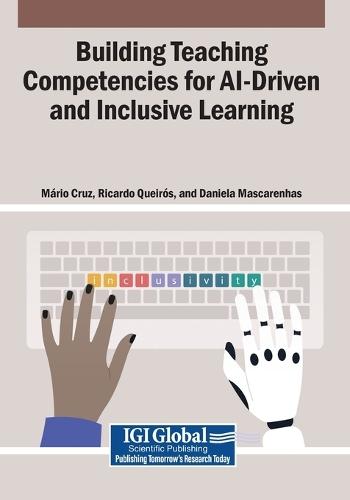Overview
The rapid integration of artificial intelligence (AI) into education reshapes how teachers design, deliver, and assess learning experiences. As classrooms become more diverse and technologically developed, educators must create new competencies to harness AI tools while ensuring inclusive, equitable learning environments. Building teaching competencies for AI-driven and inclusive learning utilizes emerging technologies while applying them in ways that support all learners. This shift enhances professional development, curriculum design, and pedagogical strategies to prepare educators for human-centered teaching and intelligent technologies. Building Teaching Competencies for AI-Driven and Inclusive Learning explores how educators can develop the skills and knowledge needed to integrate AI technologies into teaching while fostering inclusive learning environments. It examines the intersection of technology, pedagogy, and equity to ensure all students benefit from AI-enhanced education. This book covers topics such as professional development, special education, and data analysis, and is a useful resource for educators, computer engineers, sociologists, academicians, researchers, and data scientists.
Full Product Details
Author: Mário Cruz ,
Ricardo Queirós ,
Daniela Mascarenhas
Publisher: IGI Global
Imprint: Information Science Reference
ISBN: 9798337377308
Pages: 564
Publication Date: 05 November 2025
Audience:
College/higher education
,
Professional and scholarly
,
Tertiary & Higher Education
,
Professional & Vocational
Format: Paperback
Publisher's Status: Active
Availability: In Print

This item will be ordered in for you from one of our suppliers. Upon receipt, we will promptly dispatch it out to you. For in store availability, please contact us.
Author Information
Mário Cruz is a Professor at the School of Education of the Polytechnic Institute of Porto (P.PORTO), where he coordinates the Master’s in Teaching English in the 1st Cycle of Basic Education and is a member of the Technical-Scientific and Pedagogical Councils. He is also the Director of the Center for Pedagogical Innovation at P.PORTO, leading initiatives in digital learning, teacher training, and pedagogical transformation. He holds a PhD in Didactics and Training from the University of Aveiro (2011) and a PhD in Linguistic Studies from the University of Vigo (2019). His academic background also includes a Master’s in Didactics of Languages (2005, University of Aveiro), a Master’s in Teaching English and Spanish in Basic Education (2012, Polytechnic of Porto), a Master’s in Teaching English and Spanish in the 3rd Cycle of Basic Education and Secondary Education (2015, University of Aveiro), a Postgraduate Specialization in Special Education (2008, Polytechnic of Porto), and a Licentiate Degree in Teaching English and German (2002, University of Aveiro). His research focuses on language didactics, bilingual education (CLIL), digital gamification, intercultural communication, with a strong emphasis on technology-enhanced learning, experiential approaches, virtual learning communities, and generative artificial intelligence applied to education. He has played a key role in several Erasmus+ and national research projects.. He has an extensive publication record, including 57 journal articles, 15 authored books/chapters, and 14 book chapters, as well as participation in 18 international conferences as an organizer and over 20 academic events as a speaker. Additionally, he has supervised three PhD theses, 25 Master’s dissertations. His collaborative research network includes over 123 co-authors worldwide, and he actively contributes as an editorial board member and peer reviewer for international journals. His research is particularly focused on the integration of AI, gamification, and digital tools in teacher training, promoting adaptive and inclusive education methodologies. Recently, he has also acted as an external expert at the Agency for Assessment and Accreditation of Higher Education in Portugal (A3ES). Ricardo Queirós holds a PhD in Computer Science and is an Associate Professor at the Media Arts and Design School of the Polytechnic Institute of Porto (P.PORTO), where he teaches Web and Mobile programming. He is a researcher at the Center for Research in Advanced Computing Systems (CRACS) at INESC TEC Porto, with expertise in Generative Artificial Intelligence, programming education, e-learning interoperability, and gamification. As a specialist in Generative AI in education, Ricardo has taught courses on its applications in teaching and learning and has published extensively on the subject. He is also the Conference Chair of the International Computer Programming Education Conference (ICPEC), the first international event dedicated to programming education. Additionally, he is an editorial board member of high-impact journals and a Guest Editor of several special issues in Computer Science. Ricardo is the author of more than 12 books on Web/Mobile development and has published over 150 scientific works, particularly in AI-driven education, gamification, and e-learning interoperability. His contributions include European research projects aimed at developing AI-powered and gamified learning environments to enhance digital education. Daniela Mascarenhas is a Professor at the School of Education at Polytechnic of Porto (P.PORTO), where she coordinates the Master’s in Teaching for the 1st Cycle of Basic Education and in Mathematics and Natural Sciences for the 2nd Cycle of Basic Education and is a member of both the Pedagogical Council and Technical-Scientific Council. She is also the Coordinator of the Training and Pedagogical Development Office at the Pedagogical Innovation Center. She She holds a Post-Doctorate in Education Sciences (Pedagogical Supervision) and a PhD in Mathematics Didactics, with extensive experience in teacher training, inclusive education, and digital learning strategies. Her research interests include AI-driven education, inclusive learning methodologies, gamified learning experiences, and pedagogical innovation. She has coordinated and participated in several Erasmus+ projects focusing on STEAM education, competency-based learning, and the integration of technology in teacher training. Daniela has published numerous research papers and book chapters on mathematics didactics, digital education, and professional development for teachers, contributing to high-impact academic forums. She also collaborates on curriculum design for digital education, AI-driven assessment tools, and innovative teaching methodologies aimed at enhancing engagement and accessibility in learning.



